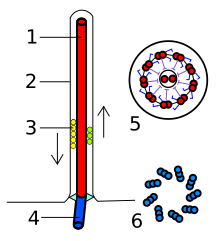基底小体


基底小体(きていしょうたい、英: basal body, basal granule)またはキネトソーム(英: kinetosome)は、真核生物の波動毛(繊毛または鞭毛)の基底部に存在するタンパク質構造である。中心小体といくつかの付属的なタンパク質構造から形成され、本質的には中心小体に変化が加えられたものである[1][2]。基底小体は、軸糸の微小管の伸長のための核形成部位として機能する。基底小体の由来となる中心小体は、微小管を中心体に固定するタンパク質の固定点の役割を果たし、微小管形成中心(MTOC)として知られる。これらの微小管は多くの真核細胞内で小胞や細胞小器官に構造的足場を提供したり移動を助けたりしている。
組み立てと構造
[編集]繊毛と基底小体は静止期または細胞周期のG1期に形成される。細胞がG1期に移行する前、すなわち繊毛が形成される前には、母中心小体は中心体の構成要素として機能している。
1つの一次繊毛しか持たない細胞では、G1期または静止期への移行に伴って母中心小体が基底小体に分化する。このように、こうした細胞では基底小体は中心小体に由来するが、基底小体は少なくとも2つの面で母中心小体とは異なる。まず、基底小体にはbasal footと呼ばれる構造が存在する。この構造は細胞質の微小管へ固定されており、繊毛の極性配置に必要である。また、基底小体には母中心小体のアペンデージ構造に由来するtransition fiberと呼ばれる風車型の構造が存在する[3]。
複数の繊毛を持つ細胞では、多くの場合基底小体は中心小体から形成されるのではなく、deuterosomeと呼ばれる特別なタンパク質構造から新規に形成される[4]。
機能
[編集]細胞周期が静止している間、基底小体は一次繊毛を組織し、細胞膜近傍の細胞皮質に位置している。細胞周期が進行すると、繊毛は再吸収されて基底小体は核へ移行し、そこで中心体を組織する機能を果たす。中心体、基底小体、繊毛は有糸分裂、細胞極性、細胞分裂、タンパク質輸送、シグナル伝達、運動性、知覚に重要である[5]。
基底小体に局在するタンパク質の変異は、バルデー・ビードル症候群[6]、口顔指症候群1型[7][8]、ジュベール症候群[9]、錐体桿体ジストロフィー[10][11]、メッケル・グルーバー症候群[12]、ネフロン癆[13]を含むいくつかの線毛関連疾患と関係している。
基底小体の形成と空間的配向の調節は、γ-チューブリンのヌクレオチド結合ドメインの機能である[14]。
植物は中心体を欠いており、運動性の精子を持つコケ植物やシダ植物などの下等植物のみが鞭毛と基底小体を持っている[15]。
出典
[編集]- ^ Schrøder, Jacob M.; Larsen, Jesper; Komarova, Yulia; Akhmanova, Anna; Thorsteinsson, Rikke I.; Grigoriev, Ilya; Manguso, Robert; Christensen, Søren T. et al. (2011-08-01). “EB1 and EB3 promote cilia biogenesis by several centrosome-related mechanisms”. Journal of Cell Science 124 (Pt 15): 2539–2551. doi:10.1242/jcs.085852. ISSN 1477-9137. PMC 3138699. PMID 21768326.
- ^ Benjamin Lewin (2007). Cells. Jones & Bartlett Learning. pp. 359. ISBN 978-0-7637-3905-8 2019年7月28日閲覧。
- ^ Kim, Sehyun; Dynlacht, Brian David (2013-08). “Assembling a primary cilium”. Current Opinion in Cell Biology 25 (4): 506–511. doi:10.1016/j.ceb.2013.04.011. ISSN 1879-0410. PMC 3729615. PMID 23747070.
- ^ Klos Dehring, Deborah A.; Vladar, Eszter K.; Werner, Michael E.; Mitchell, Jennifer W.; Hwang, Peter; Mitchell, Brian J. (2013-10-14). “Deuterosome-mediated centriole biogenesis”. Developmental Cell 27 (1): 103–112. doi:10.1016/j.devcel.2013.08.021. ISSN 1878-1551. PMC 3816757. PMID 24075808.
- ^ Pearson, Chad G.; Giddings, Thomas H.; Winey, Mark (2009-02). “Basal body components exhibit differential protein dynamics during nascent basal body assembly”. Molecular Biology of the Cell 20 (3): 904–914. doi:10.1091/mbc.e08-08-0835. ISSN 1939-4586. PMC 2633379. PMID 19056680.
- ^ Ansley, Stephen J.; Badano, Jose L.; Blacque, Oliver E.; Hill, Josephine; Hoskins, Bethan E.; Leitch, Carmen C.; Kim, Jun Chul; Ross, Alison J. et al. (2003-10-09). “Basal body dysfunction is a likely cause of pleiotropic Bardet-Biedl syndrome”. Nature 425 (6958): 628–633. doi:10.1038/nature02030. ISSN 1476-4687. PMID 14520415.
- ^ Ferrante, Maria Immacolata; Zullo, Alessandro; Barra, Adriano; Bimonte, Sabrina; Messaddeq, Nadia; Studer, Michèle; Dollé, Pascal; Franco, Brunella (2006-01). “Oral-facial-digital type I protein is required for primary cilia formation and left-right axis specification”. Nature Genetics 38 (1): 112–117. doi:10.1038/ng1684. ISSN 1061-4036. PMID 16311594.
- ^ Romio, Leila; Fry, Andrew M.; Winyard, Paul J. D.; Malcolm, Sue; Woolf, Adrian S.; Feather, Sally A. (2004-10). “OFD1 is a centrosomal/basal body protein expressed during mesenchymal-epithelial transition in human nephrogenesis”. Journal of the American Society of Nephrology: JASN 15 (10): 2556–2568. doi:10.1097/01.ASN.0000140220.46477.5C. ISSN 1046-6673. PMID 15466260.
- ^ Arts, Heleen H.; Doherty, Dan; van Beersum, Sylvia E. C.; Parisi, Melissa A.; Letteboer, Stef J. F.; Gorden, Nicholas T.; Peters, Theo A.; Märker, Tina et al. (2007-07). “Mutations in the gene encoding the basal body protein RPGRIP1L, a nephrocystin-4 interactor, cause Joubert syndrome”. Nature Genetics 39 (7): 882–888. doi:10.1038/ng2069. ISSN 1061-4036. PMID 17558407.
- ^ Kobayashi, A.; Higashide, T.; Hamasaki, D.; Kubota, S.; Sakuma, H.; An, W.; Fujimaki, T.; McLaren, M. J. et al. (2000-10). “HRG4 (UNC119) mutation found in cone-rod dystrophy causes retinal degeneration in a transgenic model”. Investigative Ophthalmology & Visual Science 41 (11): 3268–3277. ISSN 0146-0404. PMID 11006213.
- ^ Shu, X.; Fry, A. M.; Tulloch, B.; Manson, F. D. C.; Crabb, J. W.; Khanna, H.; Faragher, A. J.; Lennon, A. et al. (2005-05-01). “RPGR ORF15 isoform co-localizes with RPGRIP1 at centrioles and basal bodies and interacts with nucleophosmin”. Human Molecular Genetics 14 (9): 1183–1197. doi:10.1093/hmg/ddi129. ISSN 0964-6906. PMID 15772089.
- ^ Kyttälä, Mira; Tallila, Jonna; Salonen, Riitta; Kopra, Outi; Kohlschmidt, Nicolai; Paavola-Sakki, Paulina; Peltonen, Leena; Kestilä, Marjo (2006-02). “MKS1, encoding a component of the flagellar apparatus basal body proteome, is mutated in Meckel syndrome”. Nature Genetics 38 (2): 155–157. doi:10.1038/ng1714. ISSN 1061-4036. PMID 16415886.
- ^ Winkelbauer, Marlene E.; Schafer, Jenny C.; Haycraft, Courtney J.; Swoboda, Peter; Yoder, Bradley K. (2005-12-01). “The C. elegans homologs of nephrocystin-1 and nephrocystin-4 are cilia transition zone proteins involved in chemosensory perception”. Journal of Cell Science 118 (Pt 23): 5575–5587. doi:10.1242/jcs.02665. ISSN 0021-9533. PMID 16291722.
- ^ Shang, Yuhua; Tsao, Che-Chia; Gorovsky, Martin A. (2005-12-19). “Mutational analyses reveal a novel function of the nucleotide-binding domain of gamma-tubulin in the regulation of basal body biogenesis”. The Journal of Cell Biology 171 (6): 1035–1044. doi:10.1083/jcb.200508184. ISSN 0021-9525. PMC 2171320. PMID 16344310.
- ^ Pack, Phillip E.,. Cliffsnotes AP biology. Cliffs Notes, Inc. (4th edition ed.). Boston. ISBN 978-1-118-12799-5. OCLC 811003769
外部リンク
[編集]- Histology image: 21804loa — ボストン大学の組織学学習システム - "Ultrastructure of the Cell: ciliated epithelium, cilia and basal bodies"
